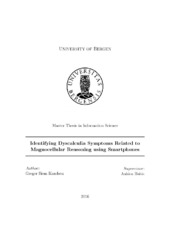Identifying Dyscalculia Symptoms Related to Magnocellular Reasoning using Smartphones
Master thesis

Åpne
Permanent lenke
http://hdl.handle.net/1956/12755Utgivelsesdato
2016-06-01Metadata
Vis full innførselSamlinger
Sammendrag
This thesis presents a research that has developed and evaluated a software application for smartphones, called MagnoMath. MagnoMath has been developed for assisting diagnosis of dyscalculia, a learning disability in mathematics, and for identifying dyscalculia symptoms possibly related to magnocellular reasoning. Typical software aids developed for individuals with learning disabilities are focused on both assisting diagnosis and teaching the material. The software developed in this project however maintains a specific focus on the former, while attempting to capture alleged correlations between dyscalculia symptoms and possible underlying causes of the condition. This was achieved by applying k-Nearest Neighbor algorithm classifying five parameters used in evaluating users' mathematical and magnocellular reasoning. Evaluation results were then utilized to support diagnosis and measure correlations between performances across the two task categories. To test MagnoMath's validity, an experiment involving seven dyscalculic and four non-dyscalculic volunteers was conducted. Results show that the software was able to reveal dyscalculic behavior. A strong correlation between deficiencies in arithmetic and spatial reasoning was identified, revealing a possible dependency valuable for detecting early signs of developmental dyscalculia. Learning disability experts at Linköping University, Sweden, University of Oslo, Norway and Dyslexia Norway have found the application to be appropriate and valuable for its intended purposes. Thus, results prove that mobile software is a suitable and valuable tool for assisting dyscalculia diagnosis and identifying possible root causes of developing the condition. Additional evaluation would be necessary to further test mobile softwares' ability to confirm the theory of magnocellular reasoning's involvement in developing mathematical deficiencies.